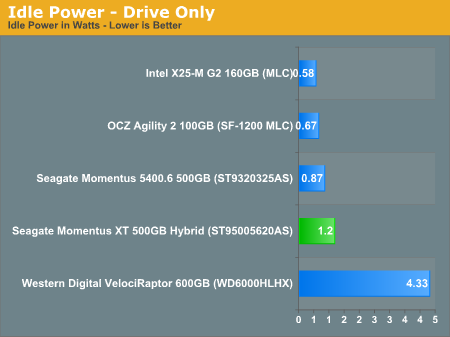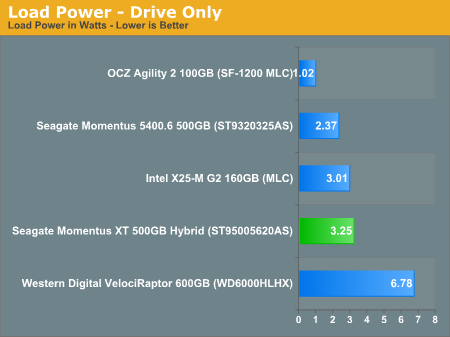Seagate's Momentus XT Reviewed, Finally a Good Hybrid HDD
by Anand Lal Shimpi on May 24, 2010 9:31 AM EST- Posted in
- Storage
- SSDs
- Seagate
- Momentus XT
- Hybrid Drive
- SSHDs
Power Consumption
Compared to the Seagate Momentus 5400.6 the XT uses considerable more power. Only when reading out of the NAND would I expect lower power consumption. What this means is that depending on your workload you might see worse notebook battery life with the Momentus XT compared to a mainstream drive. For the majority of usage models I'd expect equal if not better battery life with the Momentus.

With only the NAND active the Momentus XT draws as little as 0.61W.

Compared to an high end SSD though, the Momentus XT is still more power hungry.










120 Comments
View All Comments
numberoneoppa - Monday, May 24, 2010 - link
As much as I miss my girlfriend who's been on the other side of the world for two weeks... I've missed you more, Anand.Welcome back.
SandmanWN - Monday, May 24, 2010 - link
That's just weird...Anand Lal Shimpi - Monday, May 24, 2010 - link
HAHA that's awesome. well, not for your girlfriend.Take care,
Anand
weakerthans4 - Monday, May 24, 2010 - link
There are some itches a girlfriend just can't scratch... Welcome back Anand!!!!quiksilvr - Wednesday, May 26, 2010 - link
Please stop saying things.falc0ne - Tuesday, July 6, 2010 - link
aaa..lol? :))DoktorSleepless - Monday, May 24, 2010 - link
Why wasn't a regular 7200 rpm drive used as another reference point? That would have been nice to have as well.Anand Lal Shimpi - Monday, May 24, 2010 - link
I mentioned this on the test page, I simply didn't have a modern 7200RPM 2.5" drive on hand (only older 7200RPM 2.5" drives which were slower than the 5400.6) while I was conducting these tests. As I put together the data for our HDD bench I will add them in though :)Between the 5400.6 and the WDVR you should be able to get a good idea of where this thing falls though.
Take care,
Anand
LoneWolf15 - Monday, May 24, 2010 - link
Yeah, the one thing though is that having, say, a normal Momentus 7200 would allow us to tell if the NAND is really offering us a benefit over a drive without it, and if so, what percentage performance increase can be attributed to it.I understand you didn't have the drive at this time, but if you could update this article in the future, it would be much appreciated.
pcfxer - Tuesday, May 25, 2010 - link
The issue with that line of thinking is that this drive is not just HDD+SSD, the algorithms that the drive uses to read and write data is on a vastly different ball field. This drive is an HDD with SSD capabilities and sometimes benefits.Until everyone understands that, they (consumers) will expect SSD performance at least some of the time, which is a result of poor understanding. Of course, after all the technical articles on SSDs and as a result HDDs, I'm amazed that people would ever expect any SSD performance from a HDD with flash. The flash is just like nitrous in a car; a 100 shot doesn't offer 100hp, but maybe 60hp instead. A good poke, but not the real thing.